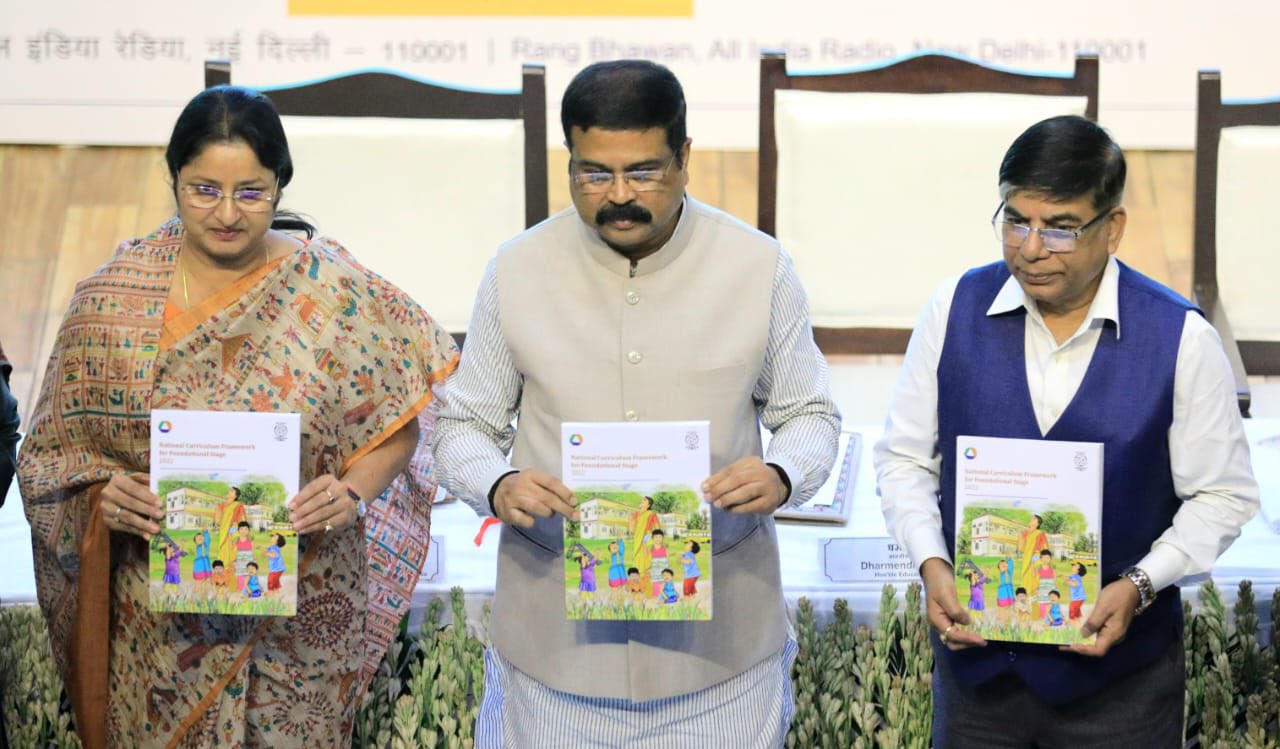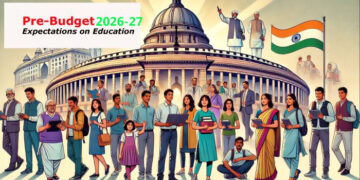On October 20, 2022, in a watershed development for early childhood children education (ECCE) in India, the country got its first ever National Curriculum Framework for Early Childhood Care and Education (NCFECCE) that offers an integrated curriculum framework for children aged between 3 and 8. The NCFECCE 2022 is one of the four frameworks being prepared for school education in India under a revised National Curriculum Framework (NCF) announced last year that will take over from NCF 2005. The other three frameworks expected to be announced soon include National Curriculum Framework for School Education (NCFSE), National Curriculum Framework for Teacher Education (NCFTE) and National Curriculum Framework for Adult Education (NCFAE).
The new revised NCF, the fourth in country’s history after a gap of 16 years is being led by the National Steering Committee (NSC) for the NCF under the chairmanship of Dr K Kasturirangan, along with the Ministry of Education, and the NCERT. A large-scale, inclusive, and iterative process for the development of the NCF that began with the announcement of the NSC in September 2021. The entire NCF is expected to be out by the end of the year.
 Speaking on the NCFECCE launch event, Union Minister of Education, Dharmendra Pradhan dubbed the release of this framework as a landmark day towards fulfilling objectives of NEP. “Developing the foundational framework was one of the most important and challenging aspect under NEP 2020, as it has a huge bearing on shaping the future of our country,” he added.
Speaking on the NCFECCE launch event, Union Minister of Education, Dharmendra Pradhan dubbed the release of this framework as a landmark day towards fulfilling objectives of NEP. “Developing the foundational framework was one of the most important and challenging aspect under NEP 2020, as it has a huge bearing on shaping the future of our country,” he added.
Being the first-ever and a comprehensive document on foundational learning aspects, NCFECCE, is seen as welcome development and a logical next step to NEP 2020 effectively extending schooling to children of 3 years and above under its 5+3+3+4 ‘curricular and pedagogical’ structure. The document notes: “Amongst the multipronged approach of NEP 2020 to transforming the ECCE landscape in the country, this NCF is one of the most important. While investments in infrastructure and other matters may take some time, curricular and pedagogical changes can happen in parallel and often faster. The objective of this NCF is to enable such a transformation in the practice of ECCE across institutions, even as other improvements happen alongside.”
The NCFECCE can be internationally benchmarked and puts India at par with the best in the world. It lays details for a holistic education plan, development stages, concepts, tools, competencies, outcomes and assessment. In words of Dr Swati Popat Vats, President, Early Childhood Association India page and President at Podar Education Network, NCFECCE is very robust and a best teacher training manual as it standardizes the key concepts and lesson plans in an otherwise disarrayed and unregulated space.
The NCFECCE prescribes play way learning methods through Play – Conversation, Stories, Toys, Music, Art and Craft. It lays emphasis on activity books and proscribes textbooks till age six. At the same time, textbooks for class 1 & 2 are recommended and have been discussed at length. Similarly, a lot of material on teaching, pedagogy and mapping competencies to NIPUN is included to give nursery teachers a fair idea of how to conduct and what to do instructions.
Another embedded thought process in the NCFECCE is the rootedness and pride in India, and its rich, diverse, ancient, and modern culture and knowledge systems and traditions. The ancient of Panchakosha Vikas (Five-fold Development) has been invoked in a bid to have a departure from commonly held belief that all knowledge flows from the west. That way it is also an attempt to revive the lost concepts and knowledge and integrate these into modern thinking. The NCF also includes history of ECCE in India with notes on notable developments in the world.
While having a full-fledged curriculum framework instead of just a chapter in the overall school framework like in the past is in itself a cheering big news for ECCE, challenges in its implementation are being equally flagged out by several practitioners and experts. The question is who is going to adopt this as the spread of pre-schooling is very small. As per Government data, of the 11.7 lakh government and government-aided schools, 9.3 lakh have primary sections but only 1.9 lakh have pre-primary sections. And wherever, these are present, it is only one-year of pre-schooling. Under Integrated Child Development Scheme (ICDS) with early education as a component, 3,91,004 out of 13,99,661 sanctioned Anganwadis are operational without professionally trained educators. So, barring a sizeable urban private school segment (which though runs its own whims and fancies), meaningful pre-schooling is not present in school systems across India. All eyes are therefore on the NEP 2020 implementation now, which has prescribed pre-schooling from age 3 and is expected to stimulate the creation of enabling legislative frameworks and provisions.
The second challenge being debated is the teachers—their supply and training. With legal mandate still missing for pre-primary teacher qualification and no pre-defined teacher education curriculum, recruiting and training teachers in pre-schooling is a huge gap. “All such wonderful documents even in the past were ahead of times and hailed but got outdated before any meaningful implementation. In present case, class 3 teacher is a new teacher and her or his role needs legitimacy through job role design and a proper qualification framework and I hope we get a B Ed( Elementary) prepared to create these teachers,” says Anurabh Singh, Director of Nehru World School, Ghaziabad and known expert on educational processes.
According to Vrinda swarup, former secretary department of school education & literacy, Ministry of education, the Government needs to extend NCTE’s mandate to pre-school teachers as it would be viable, quick and appropriate. Appearing on a TV discussion (Sansad TV) Swarup, who has done laudable work while as secretary also hoped that the two ministries—ministry of women and child development and ministry of education, will sit together and sort issues related to ECCE as ICDS has own ecosystem on education that needs to be integrated for this big roll out.
“Teacher training is always going to be a lacuna and I suggest government should think about PPP and take help from those private schools like us who have already developed some capacity in this domain. Private schools can adopt nearby public schools and support this effort. My second recommendation would be to recognize that child development everywhere is the same and therefore instead of wasting time, resources and energy in different programs under concurrent list, preschooling must be under one agency for better implementation,” says Dr Swati Vats.
While all eyes are on the National Curriculum Framework for Teacher Education (NCFTE) where teacher education will be defined for foundational learning group, it is equally important to know that the importance of 3-6 years in the age of child for parents. Overall, a defining phase for ECCE has just begun. –Autar Nehru













